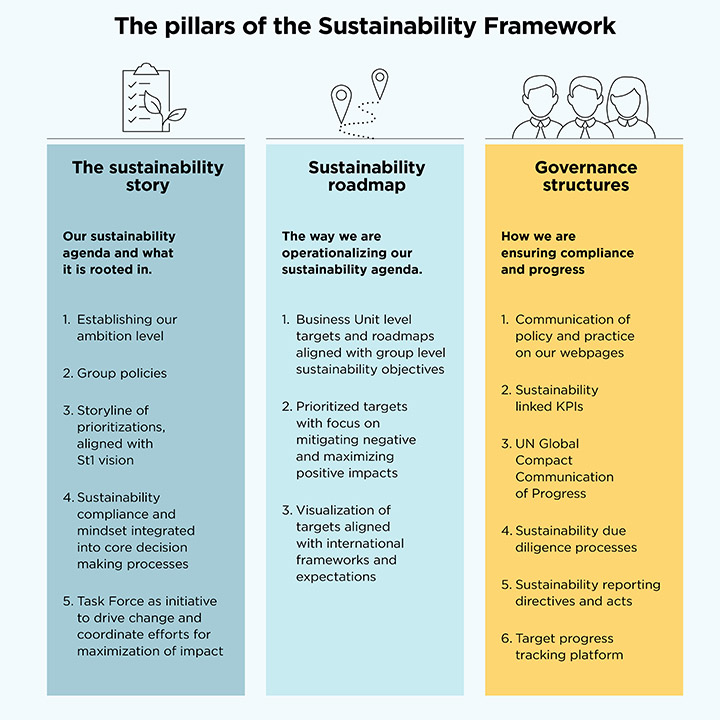
Despite COVID-19’s unpredictable disruptions, 2021 was a year of progress. The sustainability team began the year focusing on St1’s sustainability agenda and Sustainability Development Goals; company-level human rights due diligence; value chain emissions; and supply chain compliance.
As a part of St1’s strategic sustainability efforts, we took the opportunity to join the UN Global Compact SDG Ambition Accelerator Program. The program gave us concrete practical exercises as well as valuable insights on how to efficiently integrate sustainability into our daily operations. Later in the report, we will provide examples of what we were able to achieve in collaboration with all our business units.
For an organization to understand and measure its impact, cross-organizational collaboration and transparency are essential. As a Nordic company with operations in many locations, one of our priorities was to identify potential gaps in our joint processes and thereby further integrating our sustainability ambitions into our day-to-day operations and management. Thus, our sustainability team focused on data gathering and analysis to find potential gaps.
In 2021, we developed St1’s greenhouse gas inventory processes to gain more visibility on our handling of scope 1, 2, and 3 emissions and incorporating our emission reduction targets in the St1 energy transition roadmap. Reducing emissions from our value chain is a priority in the years to come

Our ambition for sustainability is high. As an organization expanding across the Nordics, and as of 2022, a little further, we also acknowledge that we are very much in the beginning of our sustainability work and that no one in our value chain can do this alone.
In 2021, the St1 sustainability team expanded remarkably from two to six persons. With this powerful and energetic team, our organization is now able to have more support than before. In the second half of the year, we added more muscle to our internal development, which enabled us to collaborate more with our partners and support them in their sustainability efforts.
To integrate sustainability into the core of our business, it is essential to have full transparency in our internal processes. In 2021, we conducted an in-depth gap analysis across our Nordic organizations to identify improvements in our management systems. Among other things, our focus was on our current risk management, counterparty management, Health, Safety, Environment, and Quality (HSEQ) management, as well as deviation reporting practices.
The ultimate objective of this work was to examine our existing operational practices and to improve in areas that we have identified as lacking robust, transparent, and Nordic-wide practices. Our focal point for the analysis were the existing practical frameworks, tools, and methods used in our operations. We recognized that by uniting some of them on the Nordic level, we will ensure that sustainability is incorporated in our operations and the daily work of our people.
The conclusion of the gap analysis showed the existence of strong processes in St1 organizations, but also a lack of certain policies, processes, and instructions on the group-level. Clear development topics have been identified for the coming years.
Our group-wide risk management approach and counterparty management practices emerged as clear areas for improvement. Besides improving the overall enterprise risk management, this will ensure that sustainability risks are an integral part of our operations across the entire St1 value chain. The work has also enabled us to identify internal best practices throughout our organization and evaluate the possibility of applying them to other parts of our business.
Our business environment is subject to a wide range of risks and opportunities due to the global reach and industrial diversity of our organizations. The role of risk management is to support the achievement of our strategic targets and business objectives and improve the continuity of our operations.
We are committed to implementing a systematic method for regularly assessing the probability and impact of sustainability and climate-related threats and opportunities. Our risk management concerns issues such as health and safety, human rights and labor rights, ethical business practices, and physical risks throughout our value chain. Our sustainability management is thus part of the multidisciplinary group-wide risk management process.
Analyzing our current management processes, and recognizing the need to improve them, has been a pivotal step in strengthening our sustainability governance. We see this work as a basis for further integrating sustainability in our core functions and risk management on the group level, while maintaining our commitment to the ten principles of the UN Global Compact and preparing for the coming EU taxonomy regulation.
-
